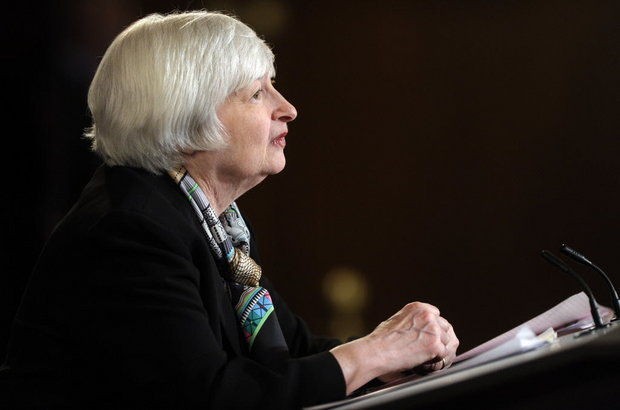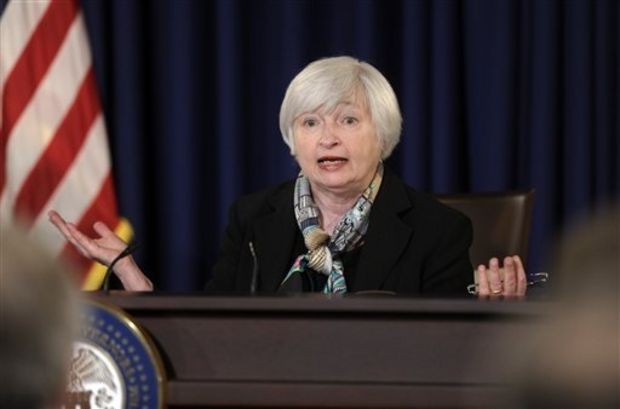Yellen says Fed will keep shortterm interest rates low
Post on: 10 Июль, 2015 No Comment

TRANSCRIPT
GWEN IFILL: Janet Yellen held her first news conference today as the new chair of the Federal Reserve, and she immediately weighed in on a few key questions. Among them, when will interest rates rise?
RELATED LINKS
- Transcripts reveal Fed reactions during 2008 economic crisis
- How will Yellen’s interest in the ‘human face’ of economics influence policy?
- Janet Yellen nominated to succeed Bernanke as Federal Reserve chair
In December 2012, Fed officials said they would keep short-term interest rates near zero until unemployment dipped to 6.5 percent. But now, as that rate has neared that level, the job market has still not fully recovered.
Today, Yellen explained why she has decided to rely on other measures beyond the jobless rate.
JANET YELLEN, Chair, Federal Reserve: Its becoming, as the unemployment rate gets closer and closer to 6.5 percent, to breaching that threshold that seems like the one that is likely to be breached.
The question is, markets want to know, the public wants to understand beyond that threshold, how will we decide what to do? But in assessing the real estate of slack in the market and ultimately of inflationary pressures that might or deflationary pressures that could result from that, its appropriate to look at many more things.
GWEN IFILL: Yellen, who the Feds vice chair under Ben Bernanke, was also asked how her role was changed.
JANET YELLEN: In many ways, I feel the buck stops with me in terms of management of the FOMC and responsibility to assure that the Federal Reserve makes progress on its goals of getting the economy back on track and making progress on our financial stability and regulation objectives.
GWEN IFILL: To help us assess the days developments at the Fed, I am joined by David Wessel, director of the Hutchins Center on Fiscal and Monetary Policy at the Brookings Institution and a columnist for The Wall Street Journal.
David, welcome back.
DAVID WESSEL, The Brookings Institution: Thank you.
GWEN IFILL: So, the news that she made today was that this tapering that we keep waiting to see whether the Fed is going to end, this support that the Fed has been providing to the economy was going to continue.
DAVID WESSEL: She said, as has been expected, that the Fed will continue to reduce the size of its monthly bond buying.
But I think the more focus on what she said about what will happen when in terms of raising interest rates.
GWEN IFILL: What did she say?
DAVID WESSEL: Well, the Fed had said, as you pointed out, that they would keep rates low well beyond the point where unemployment gets to 6.5 percent.
Were almost there, so they had to change their promises. And she had a long list of things that they are going to look at. And the bottom line was, were going to keep interest rates low for a very long time, probably well into 2015, and were going to raise them when we raise them very, very slowly, because the economy has been so weak.
GWEN IFILL: Now, there was some disagreement about when that would actually be.
DAVID WESSEL: Yes, I think what happened was, she was trying to be vague. The Federal Reserve
(LAUGHTER)
GWEN IFILL: That never happens at press conference.
DAVID WESSEL: But she made a mistake and she got a little specific.
GWEN IFILL: Ah.
DAVID WESSEL: She said they would keep rates near zero for a considerable period after they stopped buying bonds. Thats what the statement said, and I think that was meant to be vague.
Some reporter said, what do you mean considerable period? She said, oh, six months or something like that, at which point the market did the arithmetic and said, oh, my God, theyre going to raise rates in March 2015, and the stock market plunged.
If you look at the forecast of the individual members of the FOMC, she called it dot plot in their quarterly statement, you can see that most of them expect rates to go up some time in 2015.
GWEN IFILL: But she couldnt she wasnt supposed to say that?
DAVID WESSEL: I think she was meant to be very careful to be contingent, to say we are on a plan to keep rates low for a long time, providing the economy behaves as we expect. The charts showed you about 2015. I think the six months was little more specific.
GWEN IFILL: Why is unemployment not an effective yardstick anymore for deciding when the Fed should act?
DAVID WESSEL: Because the unemployment rate looks better than the job market is because so many people have dropped out of the work force.

If youre not looking for work, youre not counted as officially unemployed. And she noted, for instance, that 5 percent of the people in the work force are working part-time, but they wished they had full-time jobs. So theyre employed, but not full-time, and she said that was very high and a big concern of hers.
GWEN IFILL: When we think about the Fed and the kinds of actions they take, we think very much about numbers, and about which number goes where, and how many months, and what the interest rate is, but it seems like it also, especially in terms of interpretation at moments like this, more about nuance than about numbers.
DAVID WESSEL: Absolutely. And the markets do numbers, not nuance.
GWEN IFILL: Right.
DAVID WESSEL: So she has a difficult time.
Shes trying to communicate to the markets, were going to keep rates low for a long time. We think that if the economy behaves as we expect, that we will probably begin raising them in 2015. We have a lot of disagreement about how fast were going to raise them, and everything could change if the economy does poorly or, as she pointed out, if inflation continues to be surprisingly low, which she mentioned several times.
GWEN IFILL: Now, as you know, we watched very carefully these changes in command over at the Fed. She was Ben Bernankes deputy. The question is whether theres going to be any big change. How is she different from him?
DAVID WESSEL: I dont think there will be any big change in policy. I think what has happened, its like we had a Broadway show and we had a leading man who was the actor on the successful Broadway show for eight years. He has left the production, and this was the debut of his replacement, an actress
GWEN IFILL: The understudy.
DAVID WESSEL: Yes, the understudy.
And you never quite know how shes going to do with the spotlight on her. So I think there will be differences in style, but I dont think there will be differences in policy. And I think she handled the debut pretty well. Except for that one little slip, I think it was pretty well done. GWEN IFILL: Well, thats what I was going to ask you.
You have covered the Fed. You have covered I dont think there were press conferences before Ben Bernanke took over.
DAVID WESSEL: Right.
GWEN IFILL: But you have watched this sort of rollout before. How did she handle that and what kind of first impressions did she leave?
DAVID WESSEL: I think she was very comfortable answering questions. She seemed nervous to me when she was reading this interminably long statement. Everybody wanted to get to the statement.
She fielded the questions well. She gave very long answers. I dont know whether that was a tactic, because you give longer answers, you get fewer questions. I have seen the president, President Obama do that to you.
GWEN IFILL: Do the same thing.
DAVID WESSEL: Right. I think she used a little more economic jargon than Mr. Bernanke did. And I suspect she will work on that.
But, all in all, I give her a very high mark for a debut for which there was a lot of pressure.
GWEN IFILL: David Wessel, now of the Brookings Institution, and still writing a column for The Wall Street Journal, thanks for helping us out.
DAVID WESSEL: Youre welcome.
SHARE ON FACEBOOK SHARE ON TWITTER














